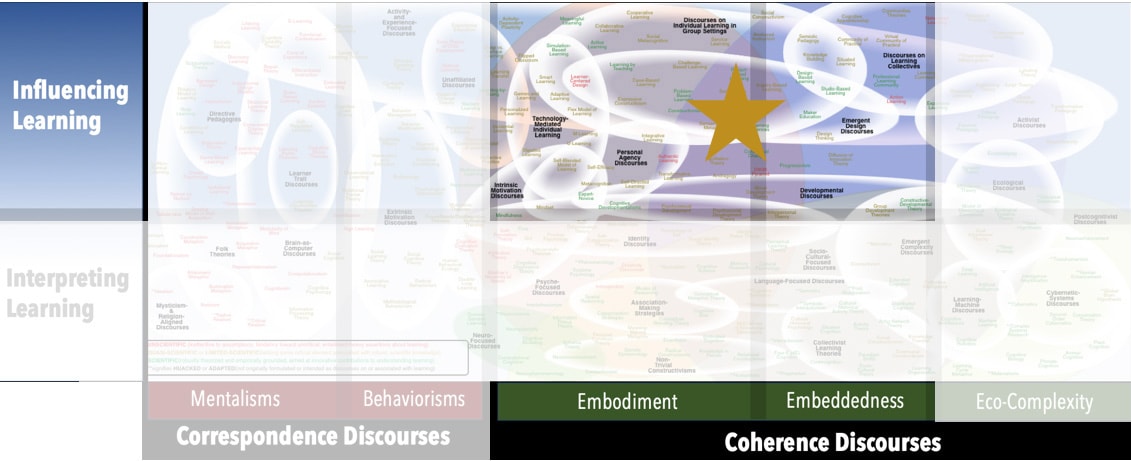AKA
Exploratory Learning
Inquiry Learning
Inquiry Method
Focus
Co-dependent, goal-oriented action among learnersPrincipal Metaphors
- Knowledge is … scope of established actions and interpretations
- Knowing is … doing
- Learner is … an investigating collective
- Learning is … developing understanding while through application and exploration
- Teaching is … facilitating, guiding
Originated
1960sSynopsis
Proposed nearly a century ago, Inquiry-Based Learning was designed to interrupt assumptions of context-free knowledge, passive learning, and smooth paths to understanding. Inquiry-Based Learning focuses on pursuing authentic interests, posing researchable questions, and participating in knowledge production. Various types of Inquiry-Based Learning have been described, including:- Structured Inquiry – teacher leads the entire class in a shared inquiry
- Controlled Inquiry – teacher selects topics and resources to be engaged by students
- Guided Inquiry (Proximal Guidance) – teacher chooses topic and students design their engagement
- Free Inquiry (Open Inquiry) – students choose topics without reference to prescribed outcomes
- Context-Based Learning (Salters’ Approach) (Salters’ Company, 1990s) – aimed at promoting deep engagement with the content, and at developing both practical and theoretical knowledge, Context-Based Learning focuses on examples (actual and fictitious) and emulates real working environments by incorporating social, cultural, and political elements
- Dyad Pedagogy (Lloyd Sherman, 1990s) – randomly assigned pairings to work through inquiry-type problems
- Guided Learning – a teaching-and-learning approach that is typically defined in contradistinction to Directive Pedagogies. Guided Learning involves a measure of learner-defined intention, and it typically occurs when learners work closely with expert (or, at least, more experienced) teachers, co-workers, and/or partners. Associated constructs include:
- Guided Participation (Barbara Rogoff, 1990s) – a broad category of acts and influences, both formal and informal, whereby members of a sociocultural group contribute to shaping the actions and thinking of children and other learners
- Guided Performance – a process of assisting a learner through the components of a complicated task, such as performing a gymnastics move or solving a problem
- Guided Play – flexible activity within defined constraints (see, e.g., Learning Toys and Tools and Games and Learning) that is geared toward specific learning goals and that is typically supported by more expert knowers
- Guided Reinvention (Realistic Mathematics Education, 1990s) – an approach to whole-class teaching designed to shepherd learners through the discernments and logical connections necessary to “invent” the concept under study. Guided Reinvention was developed through and mainly focused on mathematics learning, and it is highly reminiscent of Structured Inquiry (see above).
- Inductive Teaching (Inquiry Training Model; Inductive Problem Solving) – a mode of teaching focused on gathering relevant information, assessing factuality, identifying relationships among facts, and deriving principles and generalizations based on those relationships
- Interdisciplinary Learning [Theory] – an educational approach involving the integration of knowledge and methods from multiple disciplines. Interdisciplinary Learning is typically student-driven and issue-focused, oriented to holistic and comprehensive understanding of a topic or real-world problem.
- Knowledge Community and Inquiry (James Slotta, Hedieh Najafi, 20oos) – a model of teaching arising in a blend of Scaffolded Inquiry (see below) and Knowledge Community (see Communities Theories). The model involves community aggregation of current understandings, followed by Scaffolded Inquiry to elaborate that knowledge base.
- Question-Based Learning (Terrell Heick, 2020s) – a type of Inquiry-Based Learning that’s focused on supporting learners in forming and refining guiding questions
- Scaffolded Inquiry (Kent Crippen, Leanna Archambauk, 2010s) – a blend of Inquiry-Based Learning and the notion of Scaffolding (see Socio-Cultural Learning), revolving around the teacher’s support for learners in activities that are just beyond their current levels of independent competence
- Social Inquiry (Social-Inquiry Model) – a mode of probing social issues that combines social interaction and Inquiry-Based Learning
Commentary
Inquiry-Based Learning was originally intended as a pedagogical format, but it has become more of an umbrella notion that stretches over a wide array of methods that align with its emphases on learner involvement in authentic, situated study. On the up-side, the array of contemporary interpretations suggests broad embrace and varied uptake. On the down-side, included in the diversity are approaches – such as Discovery Learning – that lack nuanced appreciations of the Coherence Discourses that originally informed Inquiry-Based Learning. In many contexts, these trivialized interpretations have poisoned the waters for educators seeking to implement Inquiry-Based Learning.Authors and/or Prominent Influences
John DeweyStatus as a Theory of Learning
Inquiry-Based Learning is not a theory of learning.Status as a Theory of Teaching
Inquiry-Based Learning is a theory of teaching.Status as a Scientific Theory
Inquiry-Based Learning is founded on scientific theories of learning. Its own evidence base is not especially robust, however – almost certainly because of an unfortunate and inconsistent diversity of interpretations and similar variation in implementation.Subdiscourses:
- Context-Based Learning (Salters’ Approach)
- Controlled Inquiry
- Dyad Pedagogy
- Free Inquiry (Open Inquiry)
- Guided Inquiry (Proximal Guidance)
- Guided Learning
- Guided Participation
- Guided Performance
- Guided Reinvention
- Inductive Teaching (Inquiry Training Model; Inductive Problem Solving)
- Interdisciplinary Learning [Theory]
- Knowledge Community and Inquiry
- Question-Based Learning
- Scaffolded Inquiry
- Social Inquiry (Social-Inquiry Model)
- Structured Inquiry
Map Location

Please cite this article as:
Davis, B., & Francis, K. (2024). “Inquiry-Based Learning” in Discourses on Learning in Education. https://learningdiscourses.com.
⇦ Back to Map
⇦ Back to List
